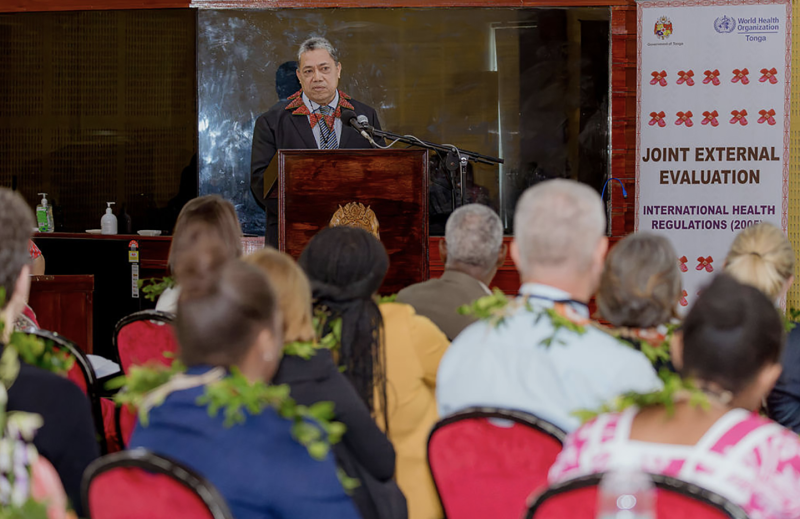
Joint External Evaluation in Kingdom of Tonga marks a significant milestone in the country’s commitment to strengthening health security
Joint External Evaluations, IHR MEF
Western Pacific Region
Tonga
The Government of Tonga marked a significant milestone by conducting its first Joint External Evaluation (JEE) to strengthen national health security preparedness and response capacities.
From 29 April to 3 May 2024, the team of international experts assessed national capacities and capabilities under International Health Regulations (2005) (IHR) - a legal framework that defines countries’ rights and obligations in handling public health events and emergencies with a potential to cross borders.
This mission marks the fifth JEE in the Pacific Region after Samoa, Marshall Islands, Micronesia, and Palau. It further amplifies the commitment of the Pacific Health Ministers made in September 2023 to strengthen resilience of health systems and communities, by leading multisectoral coordination to maximize opportunities such as JEEs.
Highlighting the significance of IHR in emergencies such as COVID-19, Honourable Dr Siale ‘Akau’ola, Tonga’s Minister of Health, said in his opening speech: “During the COVID-19 pandemic in February 2020, IHR provided us with the framework to protect the population. We look forward to the outcome of the JEE, a foundation to further work together for a resilient health system in Tonga.”
Pacific islands vulnerable to natural disasters and climate change benefit from health security investments
Tonga, like other Pacific island countries, faces distinct challenges that render it particularly vulnerable to the impact of climate change but also to outbreaks to infectious diseases. For example in 2022, the country had to face three simultaneous emergencies: a volcanic eruption of Hunga Tonga-Hunga Ha’apai, related tsunami and the first wave of COVID-19 community transmission. The Government of the Kingdom of Tonga works continuously hard to enhance the country’s preparedness for future emergencies.
Earlier this year, Tonga achieved yet another milestone when it became the first Pacific island country to apply WHO’s Strategic Toolkit for Assessing Risk (STAR) with the goal to identify hazards the country faces, including their seasonality and likelihood to occur. Tonga used insights from the STAR workshop to contribute to the JEE preparation, prioritizing hazards to further improve emergency preparedness, response and multi-sectoral coordination. Additionally, the country recently published a new national, multi-hazard risk communication and community engagement strategy to advance multi-hazard preparedness and ways to effectively communicate and engage with communities prior and during emergencies.
“I have witnessed admirable progress in bolstering Tonga’s capacity to manage health security threats, and to boost its national commitment to IHR to safeguarding the health and well-being of all Tongans. Volunteering for this Joint External Evaluation exemplifies the country’s dedication to continuous improvement and readiness,” said WHO Country Liaison Officer, Dr Anup Gurung. “This work was made possible through financial contributions from the Australian Department of Foreign Affairs and Trade and the United States Agency for International Development,” he added.
The recent Joint External Evaluation in Tonga leveraged the combined insights and expertise of national and external stakeholders to assess health security capacities in 19 technical areas and identify scope for improvement. The JEE was co-led by Dr Babatunde Olowokure (WHO’s Regional Emergency Director for the Western Pacific), and Dr Jeffery Cutter (Independent Expert, Singapore). They worked alongside other representatives from the Government of Tonga, and technical experts who were selected by the Ministry of Health in close consultation with the WHO country office.
Cross-cutting opportunities to advance health security in Tonga
Six key recommendations emerged from the JEE to advance health security capacity in Tonga. These include an enhancement of high-level political commitment and accountability at all levels to advance implementation of the IHR, including through revision and enactment of legislation and regulations to ensure implementation of IHR core capacities. The recommendations also offer an opportunity for Tonga to review its laboratory capacities; to create a National Action Plan for Health Security (NAPHS); to further develop and implement a coherent package of human resources policies, strategies and plans; and to produce a One Health framework addressing a unified approach to sustainably balance and optimize the health of people, animals and ecosystems. The key recommendations are accompanied by more than 80 priority actions for specific technical areas.
Tonga’s commitment to advancing health security is evident in reviewing progress towards IHR (2005) Monitoring and Evaluation Framework; in the country’s voluntary participation in JEE; regular submission of State Parties Self-Assessment Annual Report (SPAR); utilizing the Strategic Toolkit for Assessing Risk (STAR); regularly revising the National Plan for Emerging Infectious Diseases and Public Health Emergencies; and participating in WHO WPRO simulation exercises and conducting after-action reviews. As a result, the country continues to make progress towards meeting the IHR (2005) requirements and strengthening its health security capacities and systems.